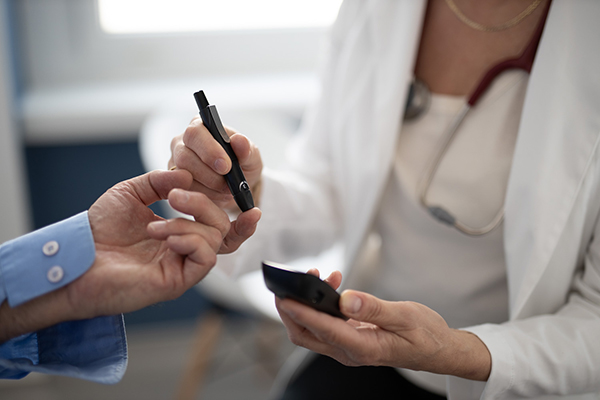

What does
Diabetology treat?
Proper blood sugar regulation is essential for our body’s healthy functioning, which is a very complex process. Its main element is the insulin hormone produced in the pancreas. Diabetes mellitus is an umbrella term that includes Type 1 diabetes, Type 2 diabetes, as well as prediabetes and gestational diabetes. Each condition must be treated, as severe, life-threatening complications can develop if neglected.
Type 1 diabetes is an autoimmune condition that develops in childhood. In this case, insulin-producing cells in the pancreas are damaged, resulting in insufficient insulin production, requiring external supplementation.
Type 2 diabetes is a civilization disease affecting hundreds of millions of adults worldwide. Obesity, unhealthy eating habits, and stress are all associated with its development. The key issue is that insulin produced by the pancreas cannot exert its effect in the body (insulin resistance), leading to persistently elevated blood sugar levels. This often causes no symptoms and can remain hidden for years. However, untreated high blood sugar can cause serious complications over the years that may lead to heart attacks, limb amputations, or even blindness. Therefore, early detection and treatment are extremely important.
Gestational diabetes occurs during pregnancy, resulting in abnormal blood sugar levels that can be dangerous for the fetus and cause various birth complications.
At our institute, besides medication therapy, we also provide lifestyle education for diabetics, and a dietitian helps with proper meal planning. For those who are overweight or obese, we offer controlled endurance-building and weight-loss-promoting physical therapy.

When should you visit a diabetologist?

How does a diabetological examination proceed?
A diabetological examination always begins with a thorough discussion of the patient’s complaints. The specialist then inquires about previous illnesses, hospital treatments, reviews current medications, and examines available previous documentation. They ask detailed questions about diet, daily routine, and any special diets.
This is followed by blood pressure and pulse measurement using an automatic blood pressure monitor.
Then comes a detailed physical examination. Our specialist assesses the skin condition and looks for signs of potential circulatory problems. The examination is completely painless. You don’t need to fast for this examination. It’s important to bring all your previous documentation and a list of your current medications. Following this, we provide lifestyle counseling and, if necessary, adjust medication therapy. If needed, we recommend additional specialist examinations to rule out potential complications (e.g., ophthalmological, cardiological, angiological examination).
A comprehensive laboratory blood and urine test is essential for accurately mapping glucose metabolism. Blood sampling must be done while fasting.
This is a special test involving two blood samples, which must first be done in the morning on an empty stomach, following a minimum 10-hour fast. For the 3 days before the test, you should maintain your usual diet containing at least 150 grams of carbohydrates and engage in normal physical activity. First, a fasting blood sample is taken, then you must consume a glucose solution (75 grams of glucose dissolved in 250-300 ml of water, within 5 minutes). After 120 minutes, another blood test is performed. We do not perform this test in cases of confirmed diabetes, but it is absolutely necessary for suspected cases or pre-diabetic conditions (impaired glucose tolerance – IGT).
The results are evaluated at a subsequent follow-up appointment.
Our Prices in Diabetology
Our Doctors in Diabetology




